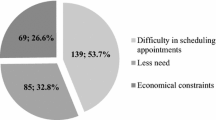Abstract
Background There is a lack of studies evaluating the factors which influence the perception of safety of over-the-counter (OTC) medications by elderly patients. Objective The aim of our questionnaire survey was to evaluate the perception of the risk of OTC medications by elderly patients and to identify patient-associated characteristics which determine elderly persons who consider OTC medications as safe. Setting 25 community pharmacies in different regions of the Slovak Republic. Methods A 54-items questionnaire was provided to patients aged ≥65 years who were purchasing at least one OTC medication during the period from May 2010 to November 2010. The questions elicited information on (a) self-assessment of health status; (b) basic characteristics of OTC medications use (e.g. frequency, duration); (c) patients’ knowledge on OTC medications; (d) participants’ perception of the risk of OTC medications; (e) the list of OTC and prescription-only medications taken; and (f) sociodemographic characteristics of respondents. Results Of the 793 questionnaires distributed, 519 were finally included in the statistical analysis (response rate of 65.4 %). Women were prevailing in the analysed group (n = 361; 69.6 %). The average age of participants was 72.2 ± 5.6 years. Majority (n = 392, 75.5 %) of the respondents considered OTC medications as safe. Multivariate analysis (binary logistic regression) revealed that elderly patients who considered OTC medications as safe were characterised by use of OTC medications every day (OR = 2.09), preferring a wide range of such drugs in pharmacies (OR = 2.86), considering such medications as effective (OR = 10.33), obtaining information on OTC drugs from pharmacists (OR = 1.91) and willingness to possibly purchase OTC medications outside pharmacies (OR = 3.35). On the other hand, allergic conditions as a reason for purchasing OTC medications (OR = 0.23), recommendation of a physician regarding the choice of OTC medications (OR = 0.51) and considering concurrent use of several medications as a factor increasing the risk of adverse drug reactions (OR = 0.62) emerged as important factors that decreased the probability of elderly patients considering OTC medications as safe. Conclusions The survey identified various factors that influenced the perceptions of the safety of OTC medications by the elderly and indicated that pharmacists represent the most trusted source of information about OTC medications.
Similar content being viewed by others
References
The story of self-care and self-medication. 40 years of progress, 1970–2010. WSMI. 2010. [online]. Available from URL: http://www.wsmi.org/pdf/storyofselfcare_brochure.pdf. Accessed 15 Feb 2012.
Francis SA, Barnett N, Denham M. Switching of prescription drugs to over-the-counter status: is it a good thing for the elderly? Drugs Aging. 2005;22:361–70.
Bond C, Hannaford P. Issues related to monitoring the safety of over-the-counter (OTC) medicines. Drug Saf. 2003;26:1065–74.
Brass EP, Shay LE, Leonard-Segal A. Analysis of multiple end points in consumer research in support of switching drugs from prescription to over-the-counter status: the concept of end-point hierarchies. Clin Pharmacol Ther. 2009;85:369–74.
Clark D, Layton D, Shakir SA. Monitoring the safety of over the counter drugs. We need a better way than spontaneous reports. BMJ. 2001;323:706–7.
Hughes L, Whittlesea C, Luscombe D. Patients’ knowledge and perceptions of the side-effects of OTC medication. J Clin Pharm Ther. 2002;27:243–8.
Bressler R, Bahl JJ. Principles of drug therapy for the elderly patient. Mayo Clin Proc. 2003;78:1564–77.
Hanlon JT, Fillenbaum GG, Ruby CM, Gray S, Bohannon A. Epidemiology of over-the-counter drug use in community dwelling elderly: United States perspective. Drugs Aging. 2001;18:123–31.
Simoens S, Lobeau M, Verbeke K, van Aerschot A. Patient experiences of over-the-counter medicine purchases in Flemish community pharmacies. Pharm World Sci. 2009;31:450–7.
Volmer D, Lilja J, Hamilton D. How well informed are pharmacy customers in Estonia about minor illnesses and over-the-counter medicines. Medicina (Kaunas). 2007;43:70–8.
Newman SC. Biostatistical methods in epidemiology. Chichester: Wiley; 2001.
Cuzzolin L, Benoni G. Safety of non-prescription medicines: knowledge and attitudes of Italian pharmacy customers. Pharm World Sci. 2010;32:97–102.
Bissell P, Ward PR, Noyce PR. Mapping the contours of risk: consumer perceptions of non-prescription medicines. J Soc Adm Pharm. 2000;17:136–42.
Ornbjerg LM, Andersen HB, Kryger P, Cleal B, Hetland ML. What do patients in rheumatologic care know about the risks of NSAIDs? J Clin Rheumatol. 2008;14:69–73.
Hanna LA, Hughes CM. Public’s views on making decisions about over-the-counter medication and their attitudes towards evidence of effectiveness: a cross-sectional questionnaire study. Patient Educ Couns. 2011;83:345–51.
Guirguis K. The use of nonprescription medicines among elderly patients with chronic illness and their need for pharmacist interventions. Consult Pharm. 2010;25:433–9.
Acknowledgments
We thank PharmD Kamil Strateny, Alzbeta Petrulova, Lenka Kubovcakova, Jana Chupacova, Daniela Smolarcukova, Dominika Jankovicova, Jana Kubickova, Miriam Kruparova, Zuzana Navratilova and Alzbeta Gyepesova for their assistance with data collection and handling.
Funding
This study was supported by grant VEGA 1/0583/13. The grant played no role in the design, methods, data collection, analysis and preparation of the paper.
Conflicts of interest
None of the authors has any potential conflict of interest.
Author information
Authors and Affiliations
Corresponding author
Rights and permissions
About this article
Cite this article
Wawruch, M., Kuzelova, M., Foltanova, T. et al. Characteristics of elderly patients who consider over-the-counter medications as safe. Int J Clin Pharm 35, 121–128 (2013). https://doi.org/10.1007/s11096-012-9718-z
Received:
Accepted:
Published:
Issue Date:
DOI: https://doi.org/10.1007/s11096-012-9718-z



